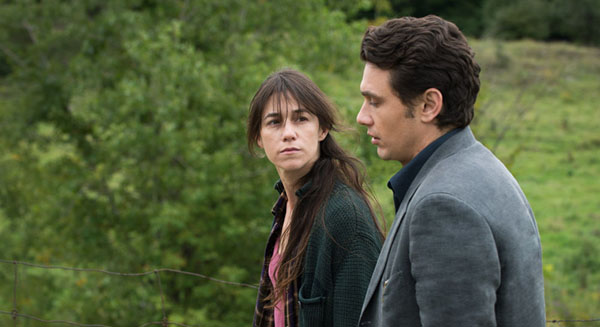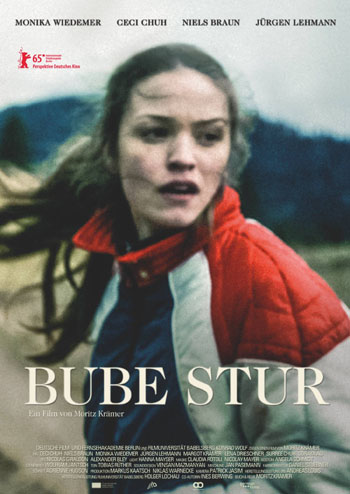The general consensus in the lobby immediately following this afternoon’s screening of Wim Wenders‘s Every Thing Will Be Fine is that the 3D isn’t necessary. I don’t entirely agree. Necessary? Probably not. But heavens, it really does bring out the beauty of Wenders’s compositions and the work of cinematographer Benoît Debie. This is a steadily, almost sleepily paced story that for the most part adheres to the conventions of redemption narratives, and Wenders, whose photography has been the subject of high profile exhibitions for at least three decades now, composes his frames appropriately. There’s nothing showy about any of the shots, but you’ve got to admire the balance and simplicity in, for example, a medium shot of James Franco, nudged a bit to the left and set against the evening sky and, to the right, a street lamp, and between them, further back, receding from the depth of field, a church tower. That’s great work in 2D; it’s truly something else in 3D.
So that’s the first thing to be said about Every Thing Will Be Fine. As a visual experience, it’s sumptuous. From here, though, it’s all downhill, I’m afraid.
You could do a lot with a character like Tomas, a novelist who accidentally kills a young boy, but someone forgot to tell Franco, who’s done more with less in Werner Herzog‘s Queen of the Desert. Charlotte Gainsbourg is better as the mother of the boy who blames neither Tomas nor herself (had she not allowed herself those few extra pages of the Faulkner novel she was reading and called her two sons in earlier that evening, she wouldn’t have lost her youngest). As girlfriends circling in orbit around Tomas, neither Rachel McAdams nor Marie-Josée Croze are given much to work with. And Alexandre Desplat has not only turned in one of his most saccharine scores, it’s smeared over Every Thing about three layers too thick.
For all that, Every Thing Will Be Fine is not terrible, nowhere near the misfire of some of Wenders’s narrative features of the past twenty years or so (Palermo Shooting, anyone?). Some, perhaps many, will lose patience with Tomas—again, his journey is neither original nor quick—but there’s more than enough to engage the eye along the way.
WHAT OTHERS ARE SAYING
Guy Lodge in Variety: “Coming from many other veteran auteurs, a film as tone-deaf and structurally haphazard as Every Thing Will Be Fine—no explanation is given, incidentally, for the title’s irksome spacing—would sound an alarming career alert. Coming from Wenders, freshly Oscar-nominated for his gleaming, gorgeous Sebastiao Salgado tribute The Salt of the Earth, this unfortunate diversion merely suggests that the creative instincts and impulses that once yielded the marvelous likes of Paris, Texas and Wings of Desire have shifted permanently to the realm of nonfiction.”
“It’s possible that Every Thing Will Be Fine is understated to a fault, that excavating its deeper meanings is deliberately impeded rather than enabled by its gently casual vibe,” suggests Michael Pattison at Indiewire. “A laughably wooden leading turn from Franco isn’t anything to voice disappointment in these days, but the extent to which his monotonous laziness infects the rest of the picture suggests catastrophically low expectations on his director’s part. (highlightszote.com) ”
More from Fionnuala Halligan (Screen) and Jessica Kiang (Playlist, C).
Updates, 2/11: “Banal and lifeless, the film clearly comes from an awful script, but Wenders’ direction isn’t just bad, it’s bizarre,” finds Adam Cook in the Notebook.
“3D is used here for spatial and emotional disorientation,” notes Ryan Gilbey in the Guardian. “The chasm separating a face from its reflection, or two soon-to-be estranged lovers from one another, appears almost infinite.”
More from Bénédicte Prot (Cineuropa), Andrew J. Simpson (Movie Mezzanine) and Deborah Young (THR). And Nigel M. Smith talks with Wenders for Indiewire.
I suspect we’ll be seeing the names of more than a few Russian directors dropped in reviews of Alexey German Jr.’s Under Electric Clouds, but throughout this morning’s screening, I could barely take my mind off Theo Angelopoulos. Like the Greek filmmaker, German trains his camera on a carefully contrived tableau, sets each of the figures within it in motion, across, forward, back, in and out of the frame, and has the camera glide to recompose within the shot, recompose again, and then again and so on. Big themes, blatant symbolism, characters as stand-ins for ideas, classes or forces—there’s an overlap in the sensibilities of Angelopoulos and German rooted 20th century modernism, its theater and poetry.
German Jr. (his father is the late Aleksei German, whose Hard to Be a God is on its way to Seattle’s Northwest Film Forum) divides Under Electric Clouds into chapters, the first set in 2017, “early modern times,” as one character puts it. Crisis has broken out all over but the Russians can only glean scant details of the environmental disaster in the southern climes, some sort of economic collapse in China and so on. Globalization has reversed its seemingly inevitable progress—but not technology. Holographic acrobats swing over a gathering of artists and the title refers to an ominous innovation: advertising projected onto the perpetual low-lying blanket of heavy gray clouds.
Other chapters touch on the resistance to the attempted coup against Gorbachev in the early 90s or skip to 2011 before fast-forwarding back again to 2017, where seven stories with multiple characters are eventually revealed to be not quite as disparate as they at first seemed. The main point of contention is architecture: what is beautiful or not, necessarily utilitarian or not, what is to be kept and restored, what is to be cleared to make way for the new. And who’ll pay for it all, and how the money landed in those hands in the first place, and are those hands clean?
I was wowed by the first clips from Under Electric Clouds when they appeared well before the festival was underway, but isolated clips don’t begin to convey what it’s like to take in all that density for 138 minutes straight. But to lean on a well-worn critical crutch, it’s a challenge that rewards.
WHAT OTHERS ARE SAYING
Lee Marshall for Screen: “Slowly assembling its cinematic mosaic piece by piece, and saturated with references to Russian history, politics, art, literature and social issues, it demands commitment of its audience; in comparison another recent Russian masterpiece, Andrey Zvyagintsev’s Leviathan, plays like an action movie. But once you surrender to the film’s slow dance it becomes strangely mesmerizing.”
Nick Holdsworth interviews German for the Hollywood Reporter.
Update, 2/11: Michael Pattison for RogerEbert.com: “Marked by a half-constructed skyscraper awaiting demolition in the distance—ever the symptom of a failed economy—the sparsely populated riverbank wastelands seen in Clouds aren’t the sort of landscapes one would want to linger in for too long, but the zooms and tracks that entrap the film’s listless ensemble of protagonists have a wholly absorbing quality. If late capitalism continues through this death agony—as indeed it surely will—then at least its final sunsets, behind the hazy veil of a light pink hue, will warm the heart.”
I’m not in a position to “review” Moritz Krämer’s Bube Stur (Stubborn Boy)—my daughter, Adrienne Hudson, edited it, I’ve met the team, saw a rough cut, helped tweak the subtitles and periodically touched base with the production throughout its realization. Still, this won’t stop me from recommending it. Its run in the Perspektive Deutsches Kino program wraps tonight but catch it if you can. It’s a quietly modest film, running 81 minutes, which is just right for this story of the effect the arrival of Hanna (Ceci Chuh, star of last year’s umsonst), a young woman fresh out of prison, has on a small farming community in the Black Forest.
For news and tips throughout the day every day, follow @KeyframeDaily. Get Keyframe Daily in your inbox by signing in at fandor.com/daily.





